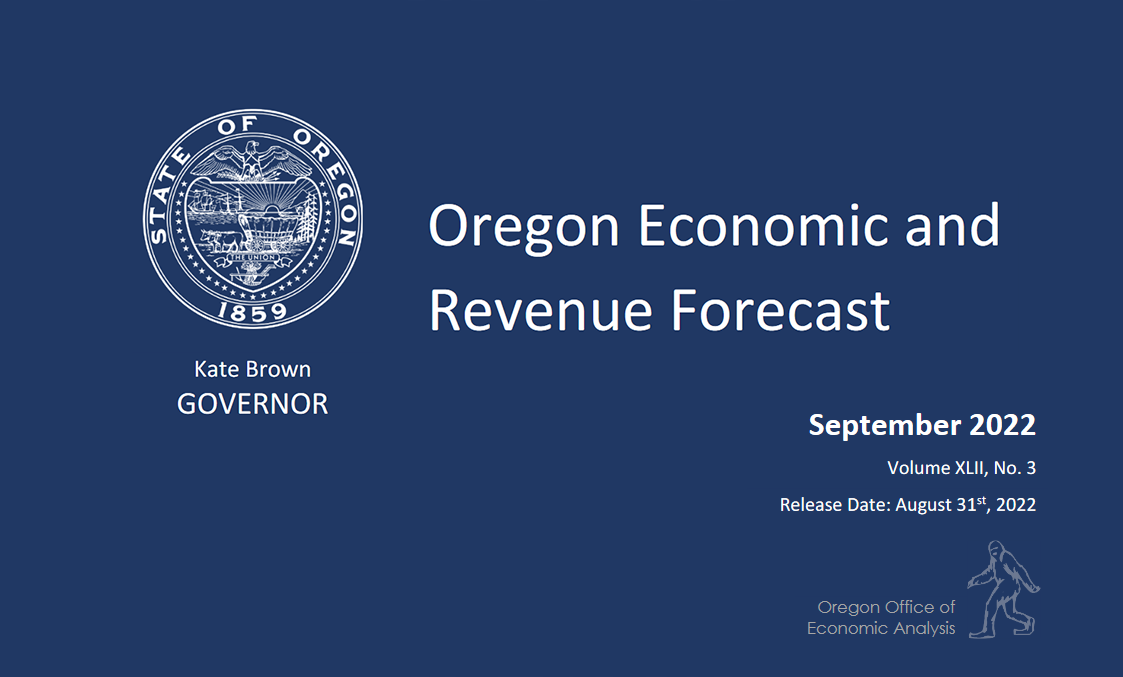Oregon Economists: Odds of a Recession are a 'Coin Flip'

According to state economists during a presentation today to the legislature’s revenue committees, Oregon is not in a recession today, but they are on recession watch. Although businesses and households are experiencing strong finances and unemployment is only a hair above historical lows, the economy faces substantial headwinds as inflation becomes more persistent. Still, the state’s baseline forecast anticipates resources to remain strong in the short term and come back down to earth during the next budget cycle.
The latest forecast projects Oregon will continue to see unanticipated revenue growth in the short term, amounting to $5.72 billion in more resources than anticipated at the start of the budget cycle. Personal income tax collections, driven largely by inflationary wage pressures and capital gains, are estimated to increase by $3.2 billion. Similarly, corporate income tax collections are projected to increase by $1.12 billion, an 82.2 percent increase from their original estimate. The unanticipated growth in these revenue sources will increase the projected amounts for the personal and corporate income tax kickers to $3.46 billion and $1.1 billion, respectively. The forecast projects the current period of outstripped revenue growth will cease during the next budget cycle, though still remaining above pre-pandemic levels.

During the economists’ presentation today, they acknowledged the baseline or primary forecast is optimistic because it assumes that federal monetary policy will achieve the soft landing from 40-year high inflation. In their 71-page report, the economists acknowledge a transition from high inflation along these lines has never been achieved. The consensus among the economic consultants who advise the state in crafting these point-in-time forecasts was that recessionary risks are very high. Many believe a baseline assuming a recession was the probable outlook.
Despite the odds of a recession being a “coin flip,” the economists relied on the soft-landing scenario from past forecasts to not send policymakers into a panic and cut budgets prematurely, only for a recession to never materialize. As a hedge, the forecast includes a substantial focus on the downside risk a recession could bring, including a sizable drop in government resources. Under the recessionary scenario, the state would experience a total revenue decline of $1.241 billion for the next recession, driving a complicated tax and fiscal landscape for the next biennium.
One of the primary challenges for Oregon’s fiscal outlook is that many public policies are tied to inflation, such as licensing fees, constraints on legal damages, and certain allocations to state programs. The economists identify three inflation-adjusted policies that could stand out in their report. First, many of the state’s labor contracts with public employees are automatically tied to inflation or negotiated in light of inflation, leading to unforeseen costs to the state budget. Second, Oregon’s minimum wage increased under a predetermined schedule in recent years due to legislative changes. Beginning in 2023, however, Oregon’s minimum wage will increase according to inflation indicators. The economists suggest the minimum wage would increase by five percent if current conditions hold. Finally, Oregon’s rent stabilization law sets an inflation-adjusted maximum allowable rent increase, which could rise to 14 percent.
The timing of a recession could also be challenging for budget and tax writers in the legislature to manage. We could see the economy continue its current expansion for many months, possibly through most of next year, only to have federal fiscal policy take its toll in late 2023. If so, Oregon would be several months into its fiscal biennium, requiring lawmakers to make tough budgeting decisions during the short, 35-day session in 2024. With the very real possibility of a recession serving as the backdrop of the 2023 session, lawmakers will need to craft a budget with exceptional economic uncertainty.





